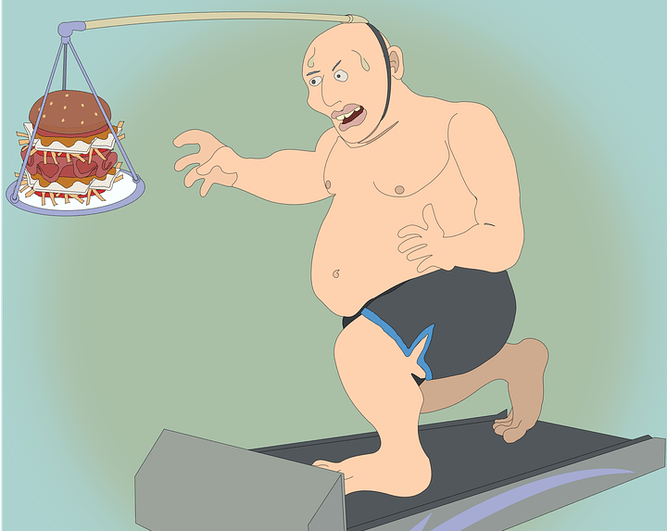TROUBLE LOSING WEIGHT?
YOUR YO-YO DIETING MAY HAVE FRIED PART OF YOUR BRAIN
|
“Yo-Yo dieting is really a metabolic disaster. What happens in the human body when cycles of weight loss and weight gain are repeated over and over again as is the case with so many overweight people? Yes, Yo-Yo dieting has negative effects on future weight loss. It can lead to weight gain, not weight loss. Probably 70% or more of individuals struggling to lose weight, are caught up in the destructive cycle of Yo-Yo dieting.” Health24, Yo-Yo Dieting = Weight Gain
|
According to Dr. Louis Aronne, director of the weight loss program at New York’s Presbyterian Hospital / Weill Cornell Medical Center, new research is pointing toward neurological damage to the brain caused by continual yo-yo dieting. The part of the brain that seems to be most affected by this phenomenon? The Hypothalamus. In an article for MedPage Today, Dr. Aronne goes on to say that, “The evidence is quite convincing – eating fattening foods causes inflammatory cells to go into the hypothalamus. This overloads the neurons and causes neurological damage“. What have I told you time and time again? When it comes to Chronic Sickness and Disease, everything is Inflammation. Learn how to control INFLAMMATION, and you will dominate both your health and your weight —- instead of them dominating you.
BUT WHAT DOES THE HYPOTHALAMUS DO?
- The Hypothalamus controls eight major Pituitary Hormones
- The Hypothalamus regulates body temperature
- The Hypothalamus regulates sexuality and reproduction
- The Hypothalamus regulates the daily cycles known as the circadian rhythm
- The Hypothalamus mediates emotional response
- The Hypothalamus has strong connections to the part of your brain that regulates your level of motivation or level of ‘drive’ (HERE)
- The Hypothalamus regulates both hunger and thirst, as well as playing a large part in metabolism
Did you catch this last one? The Hypothalamus plays a critical part in modulating your metabolism as well as your hunger levels. Foul up the Hypothalamus, and watch what happens to your weight.
HERE’S THE COOL THING
FEED IT PROPERLY, AND YOUR HYPOTHALAMUS IS CAPABLE OF REGENERATION
A study (Relationships Between Dietary Macronutrients and Adult Neruogenesis in the Regulation of Energy Metabolism) was published in last February’s edition of the British Journal of Nutrition. Neurogenesis is simply the term used to describe the ability of the nerve system and / or brain to regenerate — something that may be of great use to those of you who have totally fouled up your metabolism via yo-yo dieting. Listen to what researchers from the Department of Obesity and Endocrinology at the Institute of Aging and Chronic Disease, of the University of Liverpool, England have to say about the relationship between Neurogenesis and diet.
|
Neurogenesis, previously thought to occur only in the embryo, is now known to take place in the adult brain, dependent on numerous stimulating and inhibiting factors, including dietary components. Because of classic associations between neurogenesis and the hippocampus, in learning and cognition, this brain region has also been the focus of attention in the study of links between diet and neurogenesis. Recently, however, a more complete picture of this relationship has been building: not only has the hypothalamus been shown to satisfy the criteria for a neurogenic niche, but appetite-related mediators, including circulating hormones, such as leptin and ghrelin, pro-inflammatory cytokines and the endocannabinoid intracellular messengers, are also being examined for their potential role in mediating neurogenic responses to macronutrients.
|
SCIENCE OUT OF CONTROL?
THE HCG DIET, WEIGHT LOSS MEDS, WEIGHT LOSS SURGERIES, AND tcMRgFUS
There are a million weight loss gimmicks out there. I recently saw an estimation that by 2015, the global weight loss spending could eclipse $150 billion. Besides the crazy numbers of moronic WEIGHT LOSS SUPPLEMENTS on the market, you have the HCG Diet (Human Chorionc Gonaditrophin — a hormone of pregnancy used by steroid abusers to jump-start their shriveled testicles into making their own testosterone again after cycling off the roids), Bariatric Surgery (these involve all sorts of renditions of STOMACH STAPLING), a whole host of new WEIGHT LOSS MEDICATIONS, tcMRgFUS (trans-cranial magnetic resonance guided focused ultrasound beams aimed at specific parts of your brain for the specific purpose of diminishing hunger signals), along with any number of others. Please not that I am not saying that there is not a time or place for some of these. Nor am I telling you they don’t work — at least for the short term. But let’s be honest with each other for a minute. Do any of the things on this list address the underlying causes of obesity or CHRONIC INFLAMMATORY ILLNESS (obesity is part of this class of disease)? Of course not. And we haven’t even addressed the issue of side effects yet. So………..

